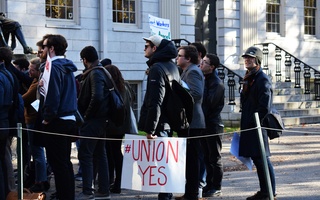{shortcode-a4b011494cc3eec6b350c260fa0262067e3f730e}The National Labor Relations Board approved an election agreement earlier this month detailing the terms of Harvard’s upcoming unionization election. The election, which will be held on April 18 and 19, will determine whether eligible graduate and undergraduate teaching and research assistants may collectively bargain.
The agreement resolves several long-standing issues that led to contested ballots in the original Nov. 2016 election, including the status of teaching assistants at the Graduate School of Design and the “lookback” period from which the list of eligible voters will be drawn.
The list of eligible voters will be generated from the March 12 payroll and will also include students who were employed as teaching assistants in the calendar year 2017.
Lawyers from the Harvard Graduate Students Union - United Automobile Workers and the University previously argued before the NLRB over whether the votes of students who were not employed as teaching assistants in Nov. 2016 would be counted.
Because graduate student course staff at the Design School are classified as teaching assistants rather than teaching fellows, they were excluded from the original University-generated voter list in 2016. HGSU-UAW attorneys contested that designation in post-election hearings at the NLRB. The terms set for the upcoming second election resolve this issue, allowing the Design School TAs to participate.
Graduate student Jae Hyeon Lee, who created the group “Against HGSU-UAW,” wrote in an email he is pleased the agreement has better clarified students’ eligibility.
“It is a good thing that it is clearer now who is eligible to vote. However, I think the makeup of the voting population is still problematic,” Lee wrote. “For the upcoming election, a lot of first and second-year students who would be most affected by the outcome of the election will be excluded from the voters' list.”
“How is an election fair if those who have most at stake are not allowed to cast a vote?” he added.
Ph.D. students who have yet to complete their general examinations, often those in their first and second year at the Graduate School of Arts and Sciences, are not eligible to teach and therefore are not part of the bargaining unit until they begin.
The agreement also resolved the debate between Harvard Graduate Students Union-United Automobile Workers and the University over the timeline for the generation of the voter list.
Harvard is required to provide a preliminary voter list to the NLRB and the union by Feb. 21. Eligible teaching and research assistants must be employed by Feb. 12 in order to be included on that list.
HGSU-UAW organizer and and graduate student Andrew B. Donnelly wrote in an email that the union is happy with the timeline for of the list’s generation.
“We were pleased to see the NLRB took such a reasonable approach with a February list with revisions in March despite Harvard’s attorneys attempt to delay,” he wrote.
In an email sent to students earlier this month, Director of Labor and Employee Relations Paul R. Curran encouraged eligible voters to seek out information in the weeks leading up to the election.
“As we move forward with a second election, it is critically important to consider again the issues at stake and engage in a robust conversation about the potential impact of unionization,” he wrote.
Harvard must provide the final copy of the voter list by March 19. In the intermediate period, involved parties will review the voter list and add any students hired by the University after Feb. 12 but before March 12.
—Staff writer Shera S. Avi-Yonah can be reached at shera.avi-yonah@thecrimson.com. Follow her on Twitter at @saviyonah.
—Staff writer Molly C. McCafferty can be reached at molly.mccafferty@thecrimson.com. Follow her on Twitter at @mollmccaff.
Read more in News
Mather House Committee Faces Backlash Over Shirt DesignRecommended Articles
-
 Online Petition Garners Support for Student Union Effort
Online Petition Garners Support for Student Union Effort -
Letter to the Editor: Lessons From First Unionization Election Must Be AcknowledgedHarvard believes it is critically important that all eligible student voters consider the issues at stake, engage in a robust conversation about the potential impact of unionization, and, most importantly, cast informed votes.
-
 Grad Student Union, Admins Clash Over Voter List for Second Election
Grad Student Union, Admins Clash Over Voter List for Second Election -
 Univ. Will Hold Second Unionization Election in April
Univ. Will Hold Second Unionization Election in April -
 Curran Details Next Steps for New Unionization Election in Email to Students
Curran Details Next Steps for New Unionization Election in Email to Students













